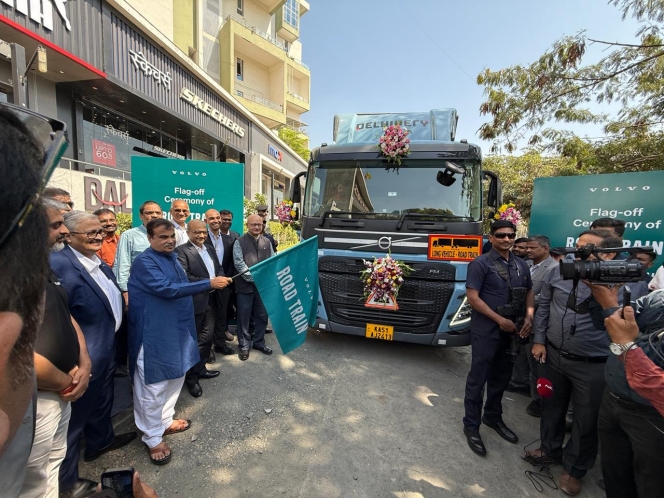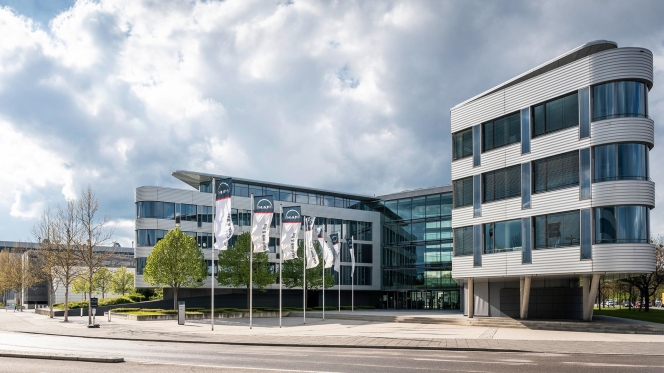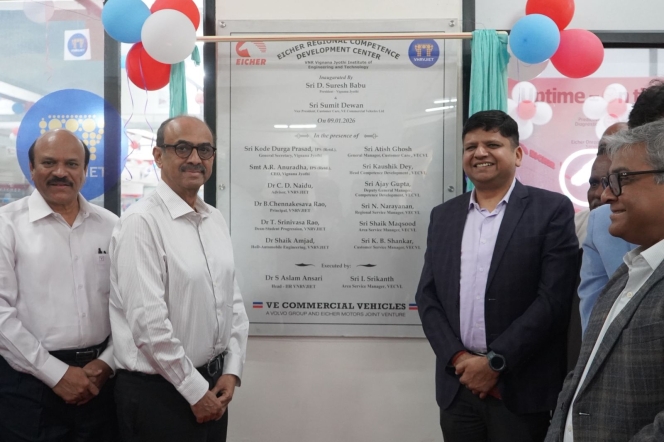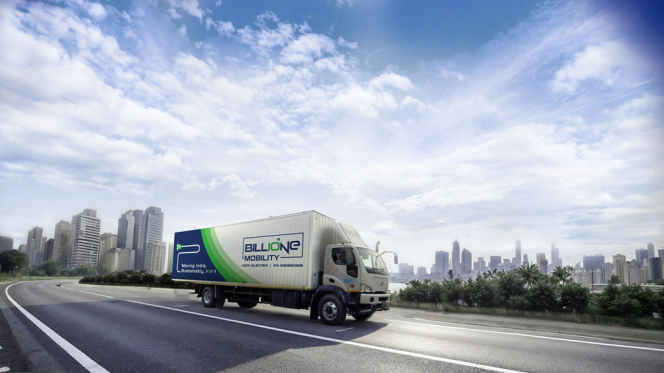Volvo Launches Advanced Road Train Solution with High-Efficiency Features in India
- By Sharad Matade
- February 15, 2025

Volvo Trucks has introduced its latest Road Train solution in India, featuring the FM 420 model optimised for high-efficiency and long-haul transportation.
The Volvo FM 420 comes equipped with a 13-litre engine delivering 420 horsepower and 2100 Nm of torque. The truck features advanced technology, including the I-Shift 12-speed automated manual transmission, which automatically selects optimal gearing for both power and fuel economy.
The new Road Train configuration offers approximately 50 per cent higher volume capacity compared to standard 18.75m tractor-trailer combinations. This increased capacity contributes to greater productivity through more cargo with a single tractor while reducing operational costs related to drivers and maintenance. Despite consuming marginally more fuel, the significantly higher load capacity results in better overall efficiency, with two Road Trains able to do the work of three conventional tractor-trailers, leading to reduced traffic and lower emissions.
In his speech, Minister Nitin Gadkari highlighted the critical challenge of high logistics costs facing the Indian economy. Speaking at an event showcasing new transport technology, Gadkari noted that while logistics costs in China stand at 8 per cent and in the USA and Europe at around 12 per cent, India's logistics costs remain stubbornly high at 16 per cent.
"This is why we are not very competitive in the international market," Gadkari explained. He announced that the National Competitiveness Authority (NCA) has set an ambitious target to reduce logistics costs to single digits—specifically 9 per cent—within two years.
The Minister expressed confidence that improved logistics efficiency would significantly boost India's export potential. "In the whole world today, there is a lot of demand, and I am 100 per cent confident that reducing logistics costs will help expand our exports," he stated.
Gadkari emphasised the importance of road quality while acknowledging that modern technology is helping address many transportation challenges. He stressed two key priorities: comprehensive driver training programmes for safer roads and the adoption of new vehicle technologies that can reduce costs.
The Minister noted that while current imports for certain vehicle categories stand at 22 lakh units, India is moving towards domestic manufacturing, which could potentially halve costs and make transportation more economical.
Looking towards the future, Gadkari expressed optimism about electric vehicles, stating: "While I don't know if it's immediately possible for all large vehicles, I am 100 per cent confident that electrification will happen in due course of time."
He praised Volvo for introducing new technology that will improve logistics efficiency, help increase exports, and reduce domestic logistics costs. Gadkari concluded by appealing to all stakeholders and customers to prioritise LNG, CNG, or electric vehicles, emphasising that while they might have higher upfront costs, their long-term value for the country and society would be greater.
Commenting on the launch, Vinod Aggarwal, MD & CEO, VE Commercial Vehicles Ltd., stated, "The Volvo FM 420 4X2 road train is another pioneering introduction by Volvo Trucks for the Indian market. Designed to enhance the efficiency and cost-effectiveness of road transport, it aligns perfectly with the ongoing transformation in Indian logistics and the government’s Gati Shakti master plan. Volvo Trucks India is grateful to Nitin Gadkariji, the Ministry of Road Transport and Highways, and ARAI for championing such advancements, and we remain committed to bringing more global innovations to India."
The solution is being operated by Delhivery Ltd.
Suraj Saharan, Co-founder and Chief People’s Officer at Delhivery, said, "We're excited to further strengthen our partnership with Volvo Trucks as we advance towards high-efficiency, sustainable long-haul logistics. From adopting tractor-trailers to LNG and electric trucks, Volvo has been a key enabler in our journey. Road trains are a natural next step, perfectly suited to our high-volume line-haul operations. With India's expressway network expanding rapidly, we look forward to scaling this innovation across more routes in the near future."
Emphasising Volvo Trucks’ unwavering commitment to safety and efficiency, B. Dinakar, EVP & Business Head, Volvo Trucks India, remarked, "Beyond productivity and cost-effectiveness, our focus is on the safe integration of this pioneering solution on Indian roads. I am grateful to the ministry for having certified this path-breaking solution. We will now work to implement this highly efficient and safe transport solution in other suitable sectors."
The new offering includes ultra-modern displays with a 12-inch digital Driver Information Display and a 9-inch touchscreen Secondary Information Display that can show 360-degree vision cameras and real-time driver coaching. Volvo has implemented an electronic stability control system that continuously monitors individual wheels on both truck and trailers, distributing brake pressure as needed for better vehicle stability and safety. For improved manoeuvrability in tight spaces, the Road Train comes with a self-steerable axle for the trailer.
An 810-litre fuel tank is designed for extended operations, allowing the trucks to run around the clock without frequent refuelling stops. The Volvo FM has earned the maximum 5-star Euro NCAP safety rating, featuring an air-suspended climate-controlled sleeper cabin with airbag protection for operator comfort and safety. The vehicle's pre-trip diagnostic system checks all vital parameters before departure and alerts drivers to potential issues via pop-up messages on the information display.
The Road Train concept was formally incorporated into regulations in 2020, allowing for vehicle combinations to operate at higher efficiency and capacity in the logistics industry. This development is part of India's ongoing efforts to modernise its transportation infrastructure and improve road train efficiency according to the Ministry of Road Transport and Highways.
Gulf Oil Lubricants Inks Strategic Partnerships With ACE, Ammann India And XCMG
- By MT Bureau
- January 19, 2026
Gulf Oil Lubricants India has established strategic alliances with three construction equipment manufacturers – ACE (Action Construction Equipment), Ammann India and XCMG. These agreements are intended to expand the company’s presence in the infrastructure segment by providing equipment-specific lubricants for the Indian market.
As part of the collaboration with ACE, Gulf has added new products to the ACE Genuine Oil range, covering machinery such as cranes, backhoe loaders, motor graders and tractors. For Ammann India, which holds a 60 percent market share in asphalt mixing plants, Gulf will serve as the official partner for its entire equipment range. This includes the development of formulations for future machinery. Additionally, Gulf will launch branded lubricants for XCMG to support its range of construction equipment within India.
Alongside these alliances, Gulf has introduced a range of specialised products including fire-resistant hydraulic oil, zinc-free hydraulic oil and CEV V diesel engine oil. These formulations are engineered to meet the requirements of new-generation equipment while improving uptime and reducing the total cost of ownership for contractors.
The company currently manages over 50 OEM associations across the automotive, industrial, and construction sectors. These partnerships are a component of Gulf’s strategy to provide technical services and product selection tailored to Indian operating environments.
Ravi Chawla, Managing Director & CEO, Gulf Oil Lubricants India, said, “Infrastructure has been a strategic focus area for Gulf for over 15 years, and these partnerships mark a significant step forward in strengthening our presence in this growing sector. By working closely with leading OEMs like ACE, Ammann, and XCMG, among others, we are able to deliver application-specific, future-ready lubricant solutions for new generation equipments that help customers improve equipment reliability, reduce downtime, and optimise total cost of ownership. We firmly believe that long-term value is built through strong, enduring partnerships.”
MAN Truck & Bus Plots EUR 1 Billion Investment In Germany By 2030
- By MT Bureau
- January 17, 2026

German commercial vehicle major MAN Truck & Bus has reached an agreement with employee representatives and the IG Metall union on its MAN2030+ programme. The initiative is designed to reduce costs by approximately EUR 900 million by 2028 while funding investments of almost EUR 1 billion in the company’s German locations by 2030.
The programme includes the development of vehicle generations based on the TRATON Modular System (TMS). Production and R&D investments will be made in Germany and Eastern Europe, where the group plans to establish a battery factory to support the transition to electric heavy-goods vehicles and buses.
The agreement secures the jobs of employees at MAN Truck & Bus in Germany until at least 2035, with a potential extension to 2040 based on sales and earnings performance. All German production sites will be retained. The company plans to adjust its workforce by 2,300 jobs over the next decade through natural fluctuation and demographic trends, avoiding redundancies or severance schemes.
Alexander Vlaskamp, CEO, MAN, said, “Following intensive negotiations, we have now reached agreement with our employee representatives on the implementation of key cornerstones of the MAN2030+ program. The plan secures MAN’s competitiveness and guarantees our customers a broad product portfolio as a full liner, which forms the basis for the company’s future success. This will enable us to secure the jobs of our current employees also in the future. With our continued high level of investment in Germany, we are fulfilling our industrial policy responsibilities. We will now consistently implement the long-term MAN2030+ program in order to counteract intensifying competition, changing market conditions and major regulatory risks at an early stage."
The EUR 900 million cost reduction will be achieved through savings in material and overhead costs, as well as sales performance improvements. The company has ruled out wage cuts and committed to continuing profit-sharing payments and above-tariff benefits.
Karina Schnur, Chairwoman of the General Works Council, MAN Truck & Bus, said, “The discussions were not easy, but they were always respectful and constructive, and from the perspective of co-determination and IG Metall, they have now resulted in the best possible compromise for our employees and the company. The agreement sends a very strong signal regarding the security, stability, and future prospects of our employees. With this agreement, we are securing the jobs of our colleagues at MAN until at least the end of 2035. And we are doing so without interfering with collectively agreed benefits. In addition, we were able to agree on profit sharing for employees and the payment of benefits above the collective agreement level – which means that MAN will remain an attractive company for future generations. Furthermore, we are securing the long-term preservation of our German locations. At the same time, we are creating the freedom to continue investing significantly in our German locations and the future of MAN.”
The programme also prioritises vocational training, with MAN committing to hire trainees amounting to at least 2 percent of the permanent workforce annually. By the mid-2030s, the company expects to employ approximately 13,000 staff across its German operations.
Volvo–Eicher Establishes Regional Competency Development Centre At VNR VJIET
- By MT Bureau
- January 13, 2026

In a strategic commitment to cultivating advanced technical expertise in South India, Eicher (VE Commercial Vehicles Limited) has established a long-term Regional Competency Development Centre at VNR Vignana Jyothi Institute of Engineering & Technology (VNR VJIET) in Hyderabad. This significant investment underscores Eicher's dedication to fostering industry-ready talent and enhancing the practical skills of its own workforce and network. The centre, inaugurated for an initial 10-year term, represents a core component of Eicher's vision for collaborative innovation and sustainable skill development within the automotive sector.
The newly inaugurated facility is equipped with a comprehensive range of operational vehicles, including diesel and electric models, alongside specialised diagnostic equipment and cut models of vital automotive systems. This infrastructure is designed to provide immersive, hands-on learning for Eicher employees and dealer partners from the Telangana and Andhra Pradesh regions. Furthermore, it creates a vital bridge to academia, offering students and faculty from key engineering disciplines direct exposure to current industry technologies and real-world automotive systems within their academic environment.
This initiative is fundamentally driven by Eicher’s objective to support sustained knowledge advancement and create a robust pipeline of skilled professionals. By enabling structured training on modern vehicle technologies, the partnership actively contributes to shaping the future of the automotive industry. It reflects Eicher's proactive approach to integrating industry practice with engineering education, thereby strengthening the ecosystem that supplies the next generation of engineers and technicians.
D Suresh Babu Garu, President, Vignana Jyothi, said, “Being selected by a global automotive leader such as Volvo–Eicher to host a Regional Competency Development Centre is a strong validation of VNR VJIET’s focus on industry-aligned education. This collaboration strengthens our commitment to providing students with the best facilities, real-world exposure and future-ready skills that meet national and global standards.”
Sumit Diwan, National Head – Customer Care, VE Commercial Vehicles Limited, said, “This Centre reflects our long-term approach to capability building and talent development. By investing in advanced infrastructure at VNR VJIET and training students alongside our workforce, we are creating a strong pipeline of skilled engineers equipped for evolving automotive and electric mobility technologies. We plan on hiring students from Automobile Engineering (AE) department and encourage greater participation of female students in the recruitment process.”
BillionE Mobility Secures USD 25 Million To Expand Electric Trucking Fleet
- By MT Bureau
- January 13, 2026

BillionElectric Mobility (BillionE) has raised USD 25 million in a growth capital round consisting of equity and debt. The funding was provided by a consortium of family offices, ultra-high-net-worth individuals and financial institutions, including the State Bank of India (SBI).
The capital is intended to transition the company from deployments to commercial operations in electric freight. A portion of the funds will support the rollout of 500 electric trucks during the FY2026-27.
BillionE Mobility currently maintains a pipeline of over 1,500 electric trucks planned for the next three years to meet demand from industrial customers.
The fleet will serve logistics for sectors including cement, automotive, metals, and e-commerce. These industries are targeted due to predictable routes and high utilisation levels, which facilitate the transition to electric vehicles.
BillionE Mobility is executing a strategy across freight corridors. These routes are being electrified by CHARGE ZONE, an affiliated company providing the charging network for the fleet. The integration aims to deliver operational efficiencies and reductions in emissions across industrial clusters.
Sanjeev Kulkarni, CEO and Co-Founder, BillionE Mobility, said, “This fundraise comes at a defining moment for electric commercial mobility in India. We are moving beyond pilots to scaled, real-world deployments where execution, reliability, and economics matter most. The capital will allow us to accelerate fleet expansion, strengthen operational readiness, and deepen partnerships with customers committed to decarbonising their logistics. Our vision is to make electric trucking a mainstream, dependable, and commercially viable choice for India’s freight ecosystem.”
Kartikey Hariyani, Founder and Chief Platform Architect of BillionE Platform, added, “I am personally indebted and grateful to our existing and new shareholders backing our vision of an Energy Transition platform enabled by electric mobility in commercial segments. Currently we are on a growth path of 120 percent on YoY basis and would like to maintain this momentum in coming months and years. Fortunately, EV trucking has achieved the total cost of ownership (TCO) at par with diesel on specific routes and use cases, especially 19T and 55T category, and this is indeed a huge boost.”
The company intends to use the investment to capture a share of the commercial vehicle market while lowering carbon intensity in freight logistics.







Comments (0)
ADD COMMENT